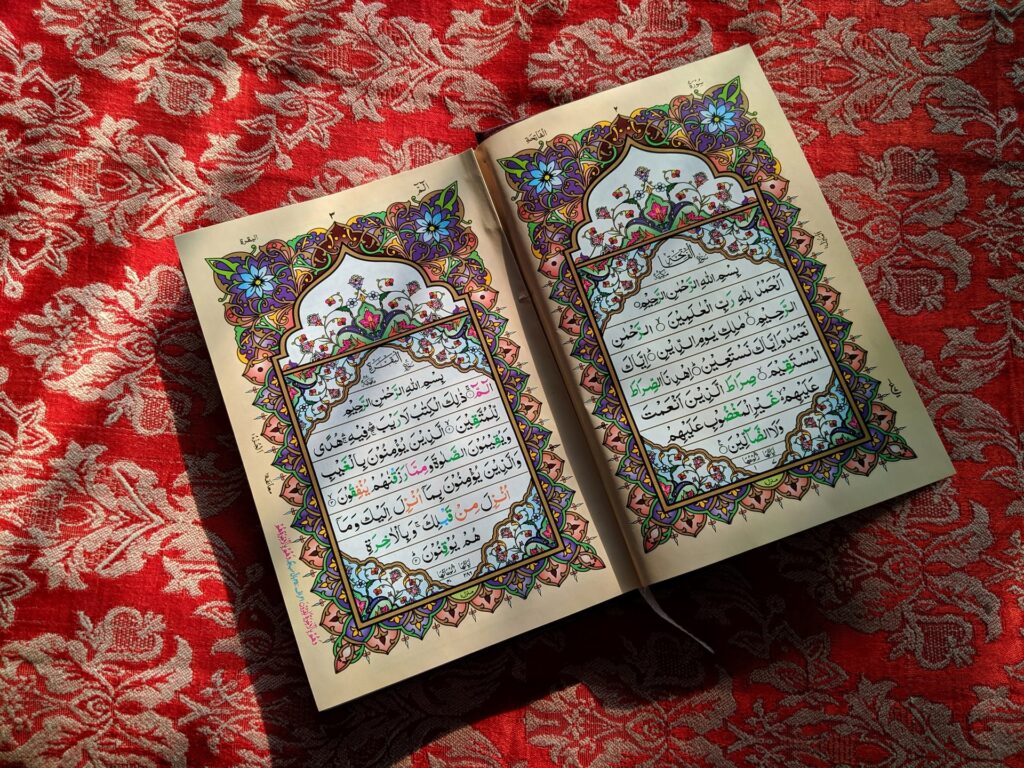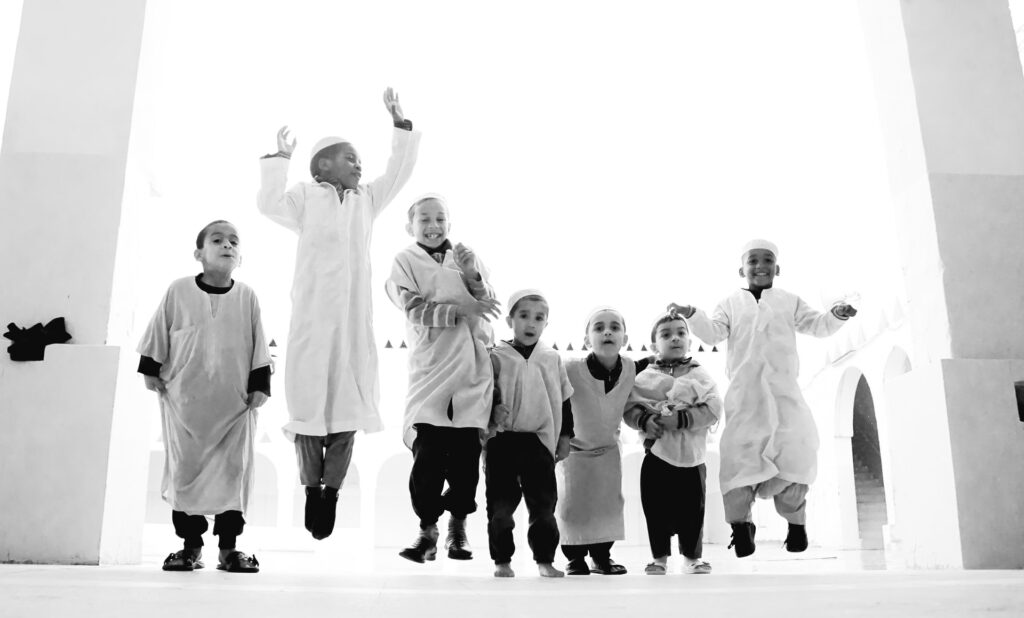The Prophet (PBUH) called Surah Al-Fatiha (The Opening) the mother of the book.
Some said it was named so because it summarizes the meaning of the entire Quran.
He also called it the greatest surah in the Quran.
Ar-Ruqya —the Spiritual Cure— is another name for Surah Al-Fatiha.
As recorded by Bukhari, one of the companions used it to cure a person bitten by a scorpion.
In the previous article, we’ve mentioned that Surah Al-Fatiha is one of the two exclusive gifts to Muslims.
Surah Al-Fatiha holds a central place in our daily lives.
Combining our five prayers, we recite it 17 times a day.
In How to Enjoy Salat, we’ve mentioned the beautiful conversation taking place when we recite Al-Fatiha.
Allah, The Most Powerful, responds to us with each recited verse.
So, if there’s any formula of success for this life and the next one, there’s a big chance to find it in this surah.
And this is what we want to look at in this article.
Surah Al-Fatiha

In the name of God, the Lord of Mercy, the Giver of Mercy!
Praise belongs to God, Lord of the Worlds,
The Lord of Mercy, the Giver of Mercy,
Master of the Day of Judgement.
It is You we worship; it is You we ask for help.
Guide us to the straight path:
The path of those You have blessed, those who incur no anger and who have not gone astray.
The First Three Verses: An Introduction to Allah
Praise belongs to God, Lord of the Worlds

The Arabic word used for praise is al-hamd.
Al-hamd encompasses the meaning of both praise and gratitude.
As they are nouns, they are timeless and don’t require a doer.
In other words, Allah will always be worthy of praise and gratitude, whether we express them or not.
Now let’s look at the word Lord (Rabb in Arabic)
In addition to lordship (master, owner), Rabb has connotations of caring, sustaining, nurturing, granting grace, correcting, and purifying.
It is said the core meaning of the word Rabb is to nurture and sustain.
This might be the reason why Rabb is frequently used in supplications.
God sustains His creation in a general or specific way.
The general way is to provide and guide the whole of the creation to what is beneficial to them.
As for the specific, it’s for His God-conscious servants.
He helps them perfect their faith and overcome the obstacles that stand between them and Him.
So this first verse shows the beginning of our relationship with God.
He’s the master and we are all His servants, whether we accept it or not.
By realizing we’ve been taken care of, we unlock a special treatment that draws us closer to Him.
The Lord of Mercy, the Giver of Mercy

Even though God is not in need of the creation, He continues to sustain it out of mercy.
Here again, we find two types of mercy. One is general; the other is specific.
Al-Rahman (the Lord of Mercy) is for all the creatures in the world: mankind, jinns, animals, believers, non-believers…
This attribute exists in Him regardless of the recipient of mercy:
“The All-Merciful rose over the throne” [Quran 33:43]
As for al-Rahim (the Giver of Mercy), it is only for believers. We need to deserve it:
“He is Most Merciful to the believers” [Quran 20:5]
The word mercy (rahma) is coming from the word rahm (the womb of a mother).
So if we want to understand God’s mercy, we just need to think about what a mom does for her child.
Others said that al-Rahman means extremely merciful right now.
While al-Rahim means always merciful but not necessarily right now.
By combining the two, Allah is covering our present and future needs.
Thinking about the future is already a sign that your present has been taken care of.
Right after mentioning His mercy, Allah reminds us that He is also the Judge.
Master of the Day of Judgement

It’s a warning and a consolation at the same time.
On that day, everyone will have a fair recompense for their choices and decisions.
Some people will receive Allah’s mercy; others will get Allah’s justice.
It is hard sometimes to understand Allah’s mercy.
One might say: where is the mercy when you are born in Gaza or live in North Korea?
Whoever is trying to understand Allah as they try to understand another human will not get it.
In the end, what matters is the permanent outcome. Everything needs to be weighed against it.
What is life on earth compared to the next one:
“On the Day He gathers them together, it will be as if they have stayed [in the world] no longer than a single hour.” [Quran 10:45]
Another question we might ask: why Allah specifies his kingship (Malik) of that day?
He already said He’s the Lord of the worlds!
Because on that day, no one can claim to own anything.
There will be no doubt about to whom belongs everything:
“[God will say], ‘Now you return to Us, alone, as We first created you: you have left behind everything We gave you, nor do We see those intercessors of yours that you claimed were partners of God.’” [Quran 6:94]
The Last Verses: Our Relationship to Allah
It is You we worship; it is You we ask for help

The three first verses are Allah introducing Himself.
Speaking in the third person conveys a sense of majesty and dominance over the creation.
And suddenly, we have a shift.
We’re talking directly to Allah. The relationship becomes intimate and personal.
Try to access any of the world’s most powerful people and see how hard it is (or even impossible).
Yet, the Most Powerful of all is accessible in the blink of an eye.
So the first step of religion is to understand who is Allah.
Then to accept Him as the only One worthy of worship.
In some sense, Al-Fatiha is a declaration of servitude.
Worship (ibadah in Arabic) means to submit.
When we say someone is worshipping him or herself, we mean they are enslaved to their desires:
“Have you seen the one who has taken his own desire as a god” [Quran 45:23]
Servitude to Allah is freedom from all that create chaos and unnecessary suffering for humans.
We can never compare the servitude to Allah and slavery as we know it.
One major difference is Allah doesn’t benefit from our servitude; we do.
Just as we worship Him alone, Him alone we ask for help.
As He has complete command over the creation, it is logical to make Him the starting point for all our needs, big or small.
Guide us to the straight path

Allah is teaching us we should ask for guidance first.
But even if you are guided, we still need to ask for it, over and over again.
The goal is not to be guided once, but to remain it and to better our God-mindfulness.
Guidance is of two types:
1. General guidance: clarifying the truth and showing the way.
But this doesn’t mean the person to whom we convey the message will actually take the path.
2. Specific guidance: in the hands of Allah Alone. This is where the servant walks the path.
Our Prophet (PBUH) was reminded of this reality when his uncle died without accepting Islam:
“You [Prophet] cannot guide those you love to the truth; it is Allah who guides whoever He will.” [Quran 28:56]
As for the sirat (translated here as path), it’s not any path. It has specific characteristics:
1. There’s no alternative to this path (it has no plural)
2. It’s straight and wide
3. It’s the shortest way to the objective
4. Clear signs indicate it is the actual route to the goal.
The sirat already means ‘straight’.
So the ‘straight path’ actually means straight upward.
When we take this path, we become less enslaved to our lower desires and temptations.
However, as we’re going up, we’ll always be struggling against gravity and the attractions of this world.
The path of those You have blessed, those who incur no anger and who have not gone astray

Who are the blessed ones?
The Quran explains itself:
“Whoever obeys God and the Messenger will be among those He has blessed: the messengers, the truthful, those who bear witness to the truth, and the righteous- what excellent companions these are!” [Quran 4:69]
We ask Allah to be In the footsteps of those already validated by Him.
And to make the path unmistakable, Allah highlights the ones who didn’t traverse it.
They are also mentioned in the Quran.
For instance, we have the Jews who took the calf (for worship) or the ones who killed their prophets.
Why they were worthy of anger?
Because they knew the right thing but still took the wrong action.
As for (those who go astray), they are the people who, out of ignorance or lack of thought, act wrongly.
These are like the Christians who exaggerated religious matters to the point of turning a prophet into a god.
They are doing the wrong thing as a result of not knowing better.
If Allah mentioned these two groups, it’s because there’s a risk to become like them.
How many Muslims know the wrong thing but do it anyway?
And how many follow their traditions and cultures which have nothing to do with Islam?
The guided ones combine beneficial knowledge with the right action.
Final Thoughts on Al-Fatiha: The Winning Formula for Success

All we need to know about Allah to begin our journey is in the three first verses of Al-Fatiha.
Allah can’t be confused with the rest of His creation.
He has showered His gifts upon us. He has sustained us through our hard times.
But even though He’s loving, comforting, and forgiving, He’s also demanding.
The way we live our lives is far more important than we think.
What we do and don’t do affects things around us.
It is especially true today that we are more connected than ever.
If you know 100 people who also know 100 people, you are one person away from 10000, and 2 persons away from a million.
So, it’s not true that our actions are insignificant.
When we realize that what we do matter and that we have a meeting with Allah, we submit.
We ask Allah for help and especially for guidance.
As with guidance, we can fix every aspect of our lives.
We start walking the path at our own pace, learning from the history of the people before us.
The more we know, the more we correct our actions.
We do the effort, and we put our trust in Allah.
What is then the Muslim winning formula for success in this life and the next one?
1. Gain knowledge of Allah
2. Sign the servitude contract
3. Correct your actions as you learn
Here you have it. Surah Al-Fatiha in a nutshell.
Article posted the 23 November 2021
Popular Articles
- Allah According to Allah: The Beauty Behind the Verse of Light
- 7 Lessons from Luqman that Will Make You Wise
- How to Enjoy Salat and Make it Meaningful
- Are Muslims Meant to Be Sleep Deprived?
- For or Against Vaccines? That’s Not Really the Question
- Islamic Psychology: A Model Where Faith Has Its Place
- Blindness: From the Invisible Gorilla to the Quranic Perspective
- Muslims’ Unity: A Powerful Solution That Takes Its Time
- The Certainties of Muslims in Uncertain World
- Mongols Invasions: Some Forgotten Lessons to Today’s Muslims
- How to Make People Change their Mind: Persuasion!
- A Few Thoughts For Muslims
- How to Honor the Prophet?
- Muslims Judging Each Other: Why and How to Be Less Judgy
